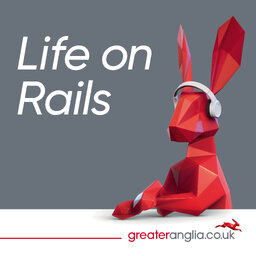How To Run a Train Company, Save Electricity and Stargaze.
In this episode of Life On Rails, the podcast that takes you behind the scenes at Greater Anglia, we hear from the managing director of Greater Anglia, Jamie Burles, who talks about what it’s like to be in charge of a large train company. We find out everything you need to know about engineering works on the railway and learn how special gadgets have saved the equivalent of over 1000 tonnes of carbon dioxide (the same amount produced by heating 370 homes), while resident fares guru Ken Strong talks about Ranger and Rover tickets. Presenters Juliette Maxam and Lucy Wright also chat with special guest celebrity astronomer Mark Thompson and recommend a train trip in East Anglia for him.
We’d love to hear from you, please tweet us at @GreaterAngliaPR #LifeOnRails. Be sure to subscribe to the podcast as well, and visit www.greateranglia.co.uk/podcast to discover more.
In 1 playlist(s)
Life On Rails
Life on Rails is Greater Anglia’s new podcast, hosted by Dom Rosso and Lucy Wright. In each episode …Social links
Follow podcast
Recent clips

Tim Dunn, prioritising customer service, and Christmas timetable changes
31:03

Lord Peter Hendy, Greater Anglia’s transition into public ownership, and Beaulieu Park station
29:35

Network Rail Anglia, Summer Fun and How To Get Cheaper Train Tickets
34:21
 Life On Rails
Life On Rails